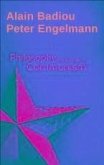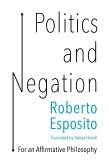Martin Heidegger is widely regarded as one of the most influential philosophers of the twentieth-century, and his seminal text Being and Time is considered one of the most significant texts in contemporary philosophy. Yet his name has also been mired in controversy because of his affiliations with the Nazi regime, his failure to criticize its genocidal politics and his subsequent silence about the holocaust.
Now, according to Heidegger's wishes, and to complete the publication of his multi-volume Complete Works, his highly controversial and secret 'Black Notebooks' have been released to the public. These notebooks reveal the extent to which Heidegger's 'personal Nazism' was neither incidental nor opportunistic, but part of his philosophical ethos. So, why would Heidegger, far from destroying them, allow these notebooks, which contain examples of this extreme thinking, to be published?
In this revealing new book, Peter Trawny, editor of Heidegger's complete works in German, confronts these questions and, by way of a compelling study of his theoretical work, shows that Heidegger was committed to a conception of freedom that is only beholden to the judgement of the history of being; that is, that to be free means to be free from the prejudices, norms, or mores of one's time. Whoever thinks the truth of being freely exposes themselves to the danger of epochal errancy. For this reason, Heidegger's decision to publish his notebooks, including their anti-Jewish passages, was an exercise of this anarchical freedom. In the course of a wide-ranging discussion of Heidegger's views on truth, ethics, the truth of being, tragedy and his relationship to other figures such as Nietzsche and Schmitt, Trawny provides a compelling argument for why Heidegger wanted the explosive material in his Black Notebooks to be published, whilst also offering an original and provocative interpretation of Heidegger's work.
Now, according to Heidegger's wishes, and to complete the publication of his multi-volume Complete Works, his highly controversial and secret 'Black Notebooks' have been released to the public. These notebooks reveal the extent to which Heidegger's 'personal Nazism' was neither incidental nor opportunistic, but part of his philosophical ethos. So, why would Heidegger, far from destroying them, allow these notebooks, which contain examples of this extreme thinking, to be published?
In this revealing new book, Peter Trawny, editor of Heidegger's complete works in German, confronts these questions and, by way of a compelling study of his theoretical work, shows that Heidegger was committed to a conception of freedom that is only beholden to the judgement of the history of being; that is, that to be free means to be free from the prejudices, norms, or mores of one's time. Whoever thinks the truth of being freely exposes themselves to the danger of epochal errancy. For this reason, Heidegger's decision to publish his notebooks, including their anti-Jewish passages, was an exercise of this anarchical freedom. In the course of a wide-ranging discussion of Heidegger's views on truth, ethics, the truth of being, tragedy and his relationship to other figures such as Nietzsche and Schmitt, Trawny provides a compelling argument for why Heidegger wanted the explosive material in his Black Notebooks to be published, whilst also offering an original and provocative interpretation of Heidegger's work.
Dieser Download kann aus rechtlichen Gründen nur mit Rechnungsadresse in D ausgeliefert werden.
"Peter Trawny knows Heidegger's manuscripts from the 1930s and 1940s better than anybody. This essay offers a thoughtful and illuminating introduction to the issues they raise that will be of value to specialists as well as beginners. I highly recommend it.?
Robert Bernasconi, Penn State University
?A beautifully-written text, not only a brilliant discussion of why Heidegger published the Black Notebooks, but also a deeper and more lasting philosophical discussion about Heidegger?s views on truth, ethics, tragedy and failure.?
Eduardo Mendieta, Stony Brook University
Robert Bernasconi, Penn State University
?A beautifully-written text, not only a brilliant discussion of why Heidegger published the Black Notebooks, but also a deeper and more lasting philosophical discussion about Heidegger?s views on truth, ethics, tragedy and failure.?
Eduardo Mendieta, Stony Brook University









